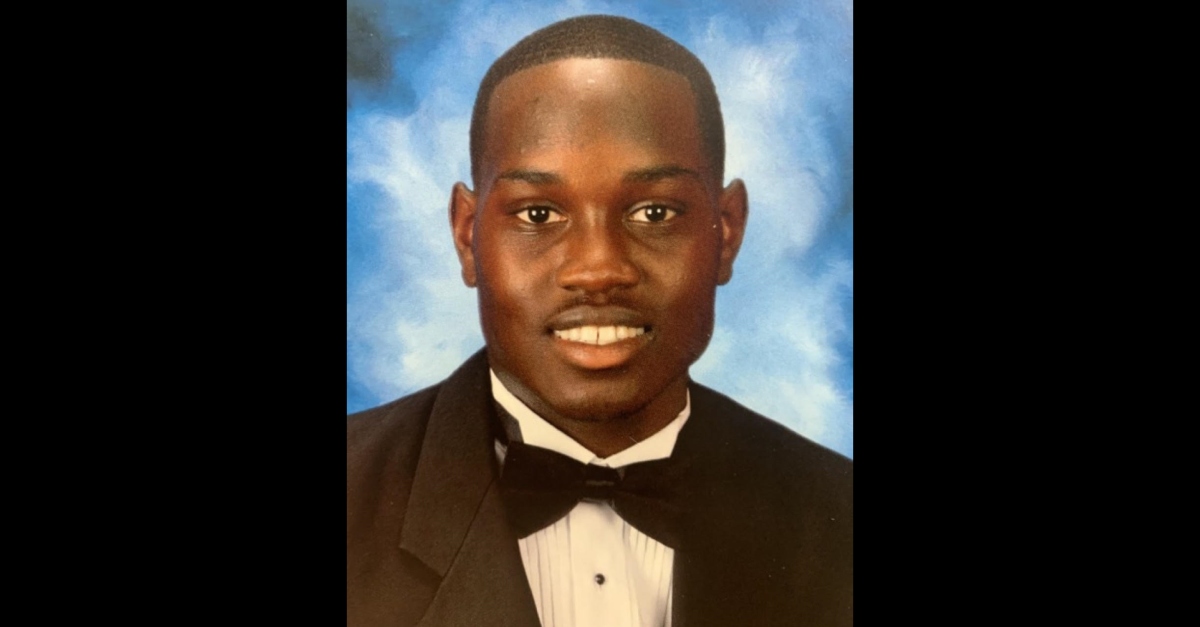
Ahmaud Arbery.
Jury selection has begun for the three men charged with murdering Ahmaud Arbery, 25, in Glynn County, Georgia. If the process goes as scheduled, shooter Travis McMichael, 35, his father Gregory McMichael, 65, and the man who recorded the incident, William “Roddie” Bryan, 52, will learn their fates in about a month.
Jury selection is slated to take one to two weeks, with the trial lasting two to three weeks. This is a big case with many fraught details. Here’s what you should know leading up to opening statements.
1. The Alleged Crime
No one disputes that Travis McMichael shot and killed Arbery in a fatal confrontation on Feb. 23, 2020, but the question before jurors is whether the shooting constitutes murder. Travis and Gregory McMichael believed Arbery could have been behind recent suspected burglaries. As seen on video recorded by Bryan, they confronted him from their white pickup truck. An armed Travis McMichael briefly grappled with Arbery before opening fire and killing him in the street.
Ahmaud Arbery’s murder was caught on video! It’s graphic but must be shared. @BenCrumpLaw will be representing Ahmaud’s father Marcus Arbery as we seek justice in this modern-day lynching. Everyone must know the truth! #JusticeforAhmaudArbery pic.twitter.com/y4kBgRJ8X6
— Ben Crump (@AttorneyCrump) May 5, 2020
Arbery’s family has said that he was just jogging in the area. For the family and their attorney Ben Crump, footage of the killing showed the defendants chase Ahmaud on mere suspicion and murder him.
It took months for the video to come out, but when it did the McMichaels and Bryan were arrested soon after; they ended up getting indicted in state court with one count of malice murder, four counts of felony murder, two counts of aggravated assault, one count of false imprisonment, and one count of engaging in a criminal attempt to commit a felony. The three men also face hate crime charges in federal court.

Travis McMichael, Gregory McMichael, and William Bryan are seen in jail booking photos.
2. The Fallout.
Three white men in the Deep South chased a Black man in broad daylight, and one of them fatally shot him.
The racial dynamics of the incident are obvious, said Brian Buckmire, a Law&Crime Network host and Brooklyn public defender who is unaffiliated with the case.
“It doesn’t take Lee Merritt or Ben Crump to say this is a modern day lynching,” Buckmire said in a phone interview.
On Monday, an attorney for Roddie Bryan insisted during pre-trial motions that the case is not about race.
Prosecutors have been mentioning race in court, however. It has been alleged that Travis McMichael called Arbery a “fucking n*****” after the shooting but before the police arrived. Prosecutors have also filed a notice saying that they intended to use racist social media posts and texts as evidence against the McMichaels. They also have evidence of “racial messages” that were extracted from the cell phone of Bryan.
Race is always going to be in the background of the case, Buckmire said, but he suggested it is unclear how the state is going to handle this in trial. In his experience, prosecutors are reluctant to bring up race, perhaps to avoid alienating members of the jury. Prosecutors don’t often go there, he said, citing his experiences as an attorney and also watching the trial of former Minneapolis police officer Derek Chauvin, who was convicted of murdering George Floyd. Buckmire suggested race would more likely be an element throughout trial, however, if a Black prosecutor ended up giving the opening statement.
Arbery’s death changed Georgia’s statues. Lawmakers repealed the citizen’s arrest law.
According to a report from the Atlanta Journal-Constitution, “the law was first enacted 1863 to allow white Georgians to capture slaves who were fleeing to fight in the Union Army.” It was later used “through the early 1900s to justify the lynching of Black people without repercussions.”
Lawmakers also passed hate crime legislation.
Fallout also a former prosecutor. Former Glynn County District Attorney Jackie Johnson, 49, who lost reelection in November 2020, was charged in September 2021 for alleged obstruction and violating her oath of office. Authorities say Gregory McMichael, a former investigator for Johnson’s office, reached out for help after the shooting.
“Jackie, this is Greg,” McMichael said in a recording in the public case file, according to The Associated Press. “Could you call me as soon as you possibly can? My son and I have been involved in a shooting and I need some advice right away.”
McMichael’s cellphone record did not show that she returned the call, but Johnson allegedly reached out to Waycross Judicial Circuit District Attorney George E. Barnhill and, “after disqualifying her office, recommended DA Barnhill to the Attorney General’s Office for appointment as the case prosecutor without disclosing that said accused had previously sought the assistance of DA Barnhill on the case.”
Barnhill, who said that the McMichaels acted legally under the aforementioned citizen’s arrest law, ended up recusing himself as well.
3. The Defense
Through attorneys and the police report, the McMichaels maintain they acted appropriately in chasing Arbery. Gregory McMichael says he was in his front yard on Feb. 23, 2020 when he saw “the suspect from the [recent] break-ins ‘hauling ass’ down Satilla Drive toward Burford Drive,” cops wrote. McMichael ran inside, called his son, grabbed his .357 magnum, and Travis McMichael grabbed a shotgun because they did not know know if the man was armed or not, according to this version of events.
“McMichael stated, ‘the other night’ they saw the same male and he stuck his hand down his pants which lead them to believe the male was armed,” police wrote.
Gregory McMichael said he and his son got into the truck and drove down Satilla Drive toward Burford Drive. They found Arbery. Travis McMichael, who was driving the truck, tried to cut him off. Arbery turned around and ran back at the direction from which he came and Bryan tried unsuccessfully to block Arbery.
The chase continued, and the men shouted, “Stop, stop, we want to talk to you.” They pulled up beside Arbery, and Travis McMichael stepped out of the truck with the shotgun, according to this story.
“McMichael stated the unidentified male began to violently attack Travis and the two men then started fighting over the shotgun at which point Travis fired a shot and then a second later there was a second shot,” police wrote. “McMichael stated the male fell face down on the pavement with his hand under his body. McMichael stated he rolled the man over to see if the male had a weapon.”
In body cam footage, Travis McMichael insisted he had no choice but to fire.
“So we run out there to stop him and talk to him,” he said. “He took off running. Stopped. He come out of the truck running at us. I told him ‘stop, stop, stop,’ til he hit me. I had nothing to do. There’s nothing else I could do.”
The defense has also tried to introduce that Arbery had a 2013 gun conviction, a 2017 attempted shoplifting conviction, and also that he was on probation when Travis McMichael killed him.
4. The Self-Defense Claim Could Work If a Juror Becomes Sympathetic to the McMichaels.
Buckmire did not hold the defense’s anticipated argument in high regard. He brought up what he called “the laugh test.” As a defense lawyer, Buckmire would recite his argument to another defense lawyer, and if they laugh, it does not pass the laugh test.
The McMichaels’ stance does not pass the laugh test, he said. Buckmire acknowledged that sometimes you have to put forward a laughable defense because it’s all they have. Nonetheless, he said they were the initial aggressors because they chased after Arbery in a truck.
Arbery’s family have sued the McMichaels and Bryan, claiming Ahmaud was just jogging that Feb. 23.
“On the afternoon of February 23, 2020, Ahmaud Arbery, a young Black man, laced up his running shoes and went for a jog,” the lawsuit stated. “An avid runner, Ahmaud frequently jogged around his neighborhood and surroundings areas in Brunswick, Georgia, including Satilla Shores. But February 23, 2020 was different. That day three armed white men, Defendants Gregory McMichael, Travis McMicheael, and William Bryan — entrusted by local law enforcement to respond to recent trespasses in the area, and armed with a Police-Department-issued revolver and a 12-gauge shotgun — hunted Ahmaud down in their trucks. Based on a ‘gut feeling’ that Ahmaud was responsible for prior thefts in the neighborhood, these Defendants shot Ahmaud three times at close range with their shotgun and killed him. As Ahmaud lay bleeding out on the pavement, Defendant Travis McMichael stood above him and said, ‘fucking N*****.'”
That “gut feeling” quote is in reference to Gregory McMichael saying he had a “gut feeling” Arbery was responsible for recent break-ins, though he didn’t know if the man had stolen anything or not.
At least one 911 call shows his son Travis claiming to have seen a Black man running into a home under construction.
“I was leaving the neighborhood and I just caught a guy running into a house being built,” he said in Feb. 11 audio obtained by The Atlanta Journal-Constitution. “When I turned around, he took off running into the house.”
Shortly before the shooting, a man believed to be Arbery was recorded on surveillance footage on February 23 at a home that was under construction. The homeowner Larry English, who lived 90 miles away, said that the property has never been robbed, however. Through an attorney, he has suggested that Arbery might have been getting water from sources on the property. Surveillance footage showed other people, including children, a man and a woman, entering the property.
Asked about the possibility of the defendants testifying, Buckmire said it would be dangerous for them.
“One step forward, 10 steps back,” he said. The video is the problem for them. Without that, they would get to control the narrative in a way that couldn’t be refuted by anyone else. But there is footage.
“The video is going to do all the testimony you want,” he said.
Buckmire maintains, however, that success for the defense depends on jury selection. If the McMichaels believe they are innocent, there must be at least one person in that county that thinks that, he suggested.
“You just need one,” Buckmire said, though he added it is very difficult to do that. The case facts don’t point that way. Nonetheless, he acknowledged that the footage did not catch everything and that could play to the advantage of either side. With that said, a sympathetic juror would be a big advantage for the defense.
“That would be a huge win for them early on in the trial,” Buckmire said.
Buckmire declined to offer a prediction for the case, but emphasized the importance of jury selection, opening statements and closing arguments. What the McMichaels knew when they chased Arbery will also be key, he said.
[Image of Arbery via office of Ben Crump; booking photo via Glynn County]
Have a tip we should know? [email protected]